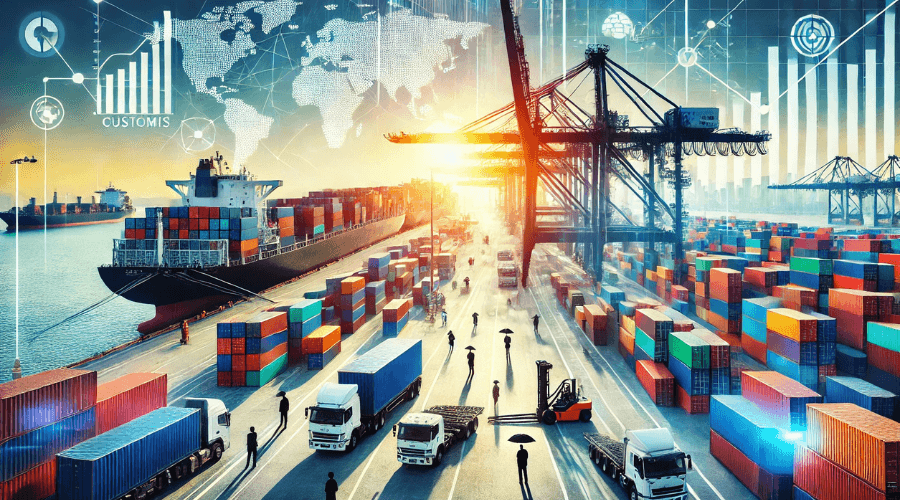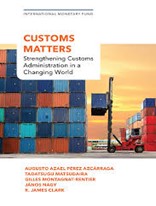Demystifying Customs: Their Impact on the Economy, Society and Security

Generally, when we hear the word “Customs”, we often think of bureaucracy and, why not say it, corruption, which, unfortunately, is true in some cases. We commonly imagine customs officials counting and weighing boxes, performing basic tasks that do not add value. This image is also perceived by high-level decision-makers, who often ignore the relevance of customs systems, paying little attention to them. It is safe to say that there is widespread ignorance about the actual role of customs, which goes beyond collecting duties and taxes.
Few people are aware that many of the products around them have passed through at least one customs office at origin and another at destination. In emerging economies, more than 53% of VAT is collected through customs, and in low-income countries, this figure is 43%. In addition, customs play a crucial role in the collection of statistics, which are essential for balance of payments and the formulation of fiscal and trade policies. They also ensure compliance with safety and security standards and contribute to the fight against terrorism and money laundering. Their work includes the correct application of tariff benefits and the protection of industry, linked to trade policy, ensuring that incentives aimed at attracting investment and promoting competitiveness are not abused, thus contributing to economic development. Would it not be vital to pay more attention to customs administrations?
To answer this question, in 2022 the International Monetary Fund published the book “Customs Matters: Strengthening Customs Administration in a Changing World” , translated into Spanish in September of this year and soon to be available in Arabic and French as well. Customs Matters: Strengthening customs administration in a changing world | IMF library
, translated into Spanish in September of this year and soon to be available in Arabic and French as well. Customs Matters: Strengthening customs administration in a changing world | IMF library
The book highlights that rapid global transformation has increased the volume and interdependence of international trade, which presents new challenges for Customs, requiring them, among other things, to digitalize their processes, adopt new technologies and manage risks more effectively in order to clear legitimate trade more efficiently and be able to identify new forms of fraud.
In addition, they must face national security risks and renewed trade protectionism trends. In this context, Customs must respond to the growing demand to facilitate trade through simpler and more transparent procedures. The COVID-19 pandemic also highlighted their essential role in the integrity and efficiency of supply chains, including in the importation of critical goods during emergencies and humanitarian crises.
These challenges highlight the need to assess and strengthen customs systems, not only to improve current practices, but also to adapt and evolve in the face of constant change. The book provides a comprehensive overview of the issues that Customs authorities and officials should consider when evaluating their system, helping them to identify their vulnerabilities and to develop and consolidate their modernization and institutional strengthening plans. Therefore, we invite everyone to read this book and discover why Customs Matters.
ㅤ
The book includes seven chapters that address the following topics:
ㅤ
Chapter I – The multiple functions of customs and its importance for the economy and society
This chapter describes the various roles of Customs and their importance to the economy and society. It discusses their evolution, including tax collection, support for competitiveness and trade facilitation. It also discusses their role in the production of trade statistics and in the fight against organized crime and terrorism.
ㅤ
Chapter II – How trade and taxation policies determine the role of customs
It examines how trade and tax policies affect customs operations, presenting challenges in revenue collection and control in a changing trade environment. It also analyzes changes in transportation, trade and investment, as well as challenges in determining the value of goods, and their implications for the customs system.
ㅤ
Chapter III – Institutional and Professional Foundations of Modern Customs Administration
This chapter addresses the fundamentals of modern customs governance, highlighting the importance of political support, strategic orientation, transparency, accountability, and cooperation with other stakeholders. The importance of qualified human resources and an integrity management framework is also highlighted.
ㅤ
Chapter IV – Customs in a World of Streamlined Trade
This chapter promotes an approach to fostering a competitive domestic economy, ensuring fair revenue collection and risk-based border controls. It highlights the importance of user-friendly procedures and collaboration with other agencies, based on the four pillars of trade facilitation: transparency, simplification, harmonization, and standardization.
ㅤ
Chapter V – Strengthening key customs processes through integrated risk management
It details how integrated risk management can help Customs strengthen controls, facilitate trade and improve traders’ compliance. It discusses why risk management has not been effective in many Customs Administrations and provides practical guidance for identifying weaknesses in controls. It also provides guidance on how to optimize the use of data to facilitate legitimate trade and mitigate threats.
ㅤ
Chapter VI – Customs Control and Cooperation with other Administrations
This chapter provides guidance on how Customs administrations can improve their programs to control and combat smuggling and fraud. It analyzes the context of Customs control and identifies the current and emerging challenges and risks they face.
ㅤ
Chapter VII – Customs Administration and Digitalization
This chapter explores the opportunities and challenges posed by Information and Communication Technologies (ICTs) and other modern technologies. It analyzes the reasons for the poor performance of some customs administrations, despite the fact that they have implemented modern ICTs. It also suggests potential applications of advanced technologies for data analytics and artificial intelligence.
8,014 total views, 10 views today
